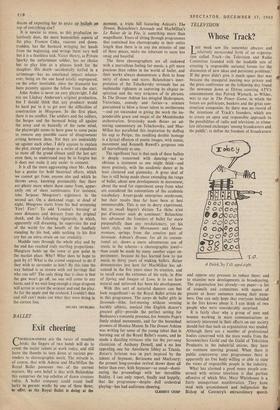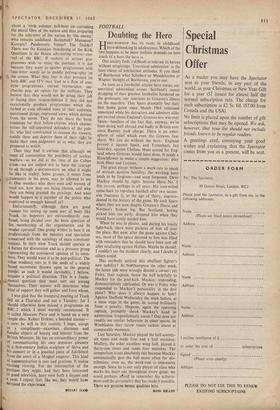TELEVISION
Whose Track?
LAST week saw the somewhat obscure and relatively unrecorded birth of an organisa- tion called Track—the Television and Radio Committee founded with the laudable aim of creating 'a responsible national forum for the discussion of new ideas and persistent problems.' If the press didn't give it much space that was because the inaugural meeting was private and the press conference on the following day found the newsmen down at Elstree covering ATV's announcement that Patrick Wymark, as Wilder, was to star in The Power Game, in which the forces are politicians, bankers and the great con- struction companies. So there was no record of the intentions of Track's founders, which are to create an open and responsible approach to the possibilities of radio and television; to stimu- late informed exchanges 'among broadcasters and the public'; to define the freedom of broadcasters
A Dalek,. by T.O. aged eight
and oppose any pressure to reduce them; and to examine new developments in broadcasting. The organisation has already—on paper—a list of councils and committees with names of greater or lesser eminence among their mem- bers. One can only hope that everyone included in the lists knows about it. I can think of two people who were considerably surprised.
It is fairly clear why a group of men and women working in mass communications or seriously interested in their effects on our society should feel that such an organisation was needed. Although there are a number of professional bodies concerned with the mass media from the Screenwriters Guild and the Guild of Television Producers to the industrial unions, they have no common meeting ground. When there is public controversy over programmes there is apparently no free body willing or able to state the views of responsible people in the industry.
What has alarmed a good many people con- cerned with serious television is that puritan offensive of which Mrs. Mary Whitehouse is a fairly unimportant manifestation. They have read with astonishment and indignation the Bishop of Coventry's extraordinary speech
about a 'sixth column' bell-bent on corroding .the moral fibre of the nation and thus preparing for the take-over of the nation by 'the enemy,' who remains undefined. Beelzebub? Mammon? Kosygin? Pandemotic Venus? The Daleks?
There was the Knoxian thundering of the Kirk.
Questions in the House advocating stricter con- trol of the BBC. If makers of serious pro- grammes wish to resist the puritans it is not because they want to spatter programmes with four-letter words or to peddle pornography on ?)". the screen. What they fear is that pressure on
both BBC and ITV may lead to a flow of ano- dyne programmes, eternal reassurance, sac-
charine pap, an opiate for the millions. They believe that they would not be doing their job or facing their responsibilities if they did not occasionally produce programmes which dis- turbed or even offended some of their audience, questioned things, expressed views which deviate from the norm. They do not share the basic contempt for their fellow-citizens which charac- terises the self-appointed defenders of the pub- lic, who feel constrained to cocoon the viewers, coddle them and deprive them of their right to make their own judgments as to what they are prepared to watch.'
Thus they find it curious that although we must all contemplate the possibility of nuclear warfare—as we did at the time of the Cuban crisis—we are judged not to have the courage to sit through a documentary on what it might be like in reality. Some groups, it seems from ,statements in the press, may be allowed to see it. One wonders who these men and women of steel are, how they are being chosen, and why they are being granted the privilege. And what would happen to a member of the public who contrived to smuggle himself in?
Unfortunately, although there are good reasons for setting up some sort of body like Track, its begetters are extraordinarily con- fused, being divided over the basic question of the membership of the organisation and its modus operandi. One group wishes to base it on professionals from the industry and specialists concerned with the sociology of mass communi- cations. In their view Track should operate as a forum for discusssion and as a pressure group representing the considered opinion of its mem- bers. They would want it to be non-political. The other tendency sees in it the seeds of a widely based movement thrown open to the general Public; as such it would inevitably, I believe, acquire a political direction. This is a funda- nental question they must sort out among themselves. Their answer will determine what kind of support they will gather and from whom.
I was glad that the inaugural meeting of Track fell on a Thursday and not a Tuesday; for I should otherwise have missed a programme on BBC-2 which I must warmly recommend. It is called Museum Piece and is based on a very simple idea. Robert Erskine, a bearded maniac— a term he will• in this context, I hope, accept as a compliment—examines, discusses and handles objects of beauty and interest from the British Museum. He has an extraordinary power of communicating his own sensuous pleasure in a first-century Indian sculpture of Shiva and his consort or in a jewelled piece of Edelkitsch from the court of a Moghul emperor. This kind of communication is rare and precious. It makes exciting viewing. For the information of the Puritans they might, had they been interested is good television, have seen both a lingam and a yoni. I expect that, like me, they would have survived the experience.
STUART HOOD































 Previous page
Previous page